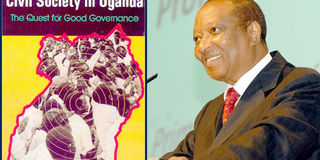
Decentralisation is at best a quest for good governance. The centre-local dichotomy, which defines and refines it as a conceptual level that goes a long way to improving Uganda’s macro and micro politico-economic environment.
The late Apolo Nsibambi and a group of other esteemed academics, took a stab at it merits and demerits in this enlightening book. They begin, in the introduction, with a definition of good governance in order to frame their arguments.
Good governance, according to a 1989 World Bank Report titled Sub-Saharan Africa: From Crisis to Sustainable Growth, is defined by its features.
To be deemed so, it must guarantee human rights, check corruption, and promote democratisation as well as accountability.
To achieve these foundational goals, the National Resistance Movement (NRM) originated the idea of decentralisation.
It is assumed that the centralisation of power before the NRM took the reins of government was a byway to dictatorship.
The 1967 Local Administration Act vested too much power in the hands of the executive, Nsibambi shows in the introduction.
In chapter two, the introduction seems to have doubled as chapter one, has Geoffrey Tukahebwa examining the role of local councils in the context of decentralisation.
Is it a boon or a bane, he asks in not so many words. In this regard, he evaluates the performance of council standing committees, specified committees such as tender boards, district service commissions and their interface with civil society to reveal some eye-opening facts.
In chapter three, Sabiti Makara weighs in like a pre-bout heavyweight boxer, as he looks at the institutional relationships between political and administrative leaders in the decentralisation process.
He also dives into the institutional and legal framework within which the local government system in Uganda operates. It explores how the interface between the centre-local administrations underpin civil society.
Chapter four sees the return of Nsibambi to analyse the financial dimension of decentralisation, namely financial decentralisation.
He reveals the discretionary goings-on of local governments with respect to the same, disentangling the financial transfers in relation to functions devolved from the centre to the districts.
This is when local taxes were believed to be partially beneficial to local demands, so he audits the viability of this and studies the status of financial accountability, with respect to council leadership.
In Chapter five, Francis Lubanga peers closely at the process of personnel decentralisation in the context of institutional and popular accountability in local governments.
Does sending personnel from the centre to the periphery, as it were, promote efficiency in service delivery? You might have the answer to that now as hindsight is 20/20. However, back in the 1990s, this was a legitimate question.
In Chapter Six, Rebecca Mukyala-Makika places a microscopic lens above the role of traditional leaders in order to magnify the extent of democratic decentralisation thereof.
In so doing, she uncovers the potential of these leaders to serve as countervailing forces to the commodious reach of the state.
As a byproduct of this investigation, she intellectually strolls down the roads of political elasticity, stability and social order.
Many factors come into play here such as the competition between political and traditional leaders in terms of legitimacy and access to resources.
In Chapter Seven, Betty Kwagala discusses how non-governmental organisations, communities and governments of a local and national inclination merge with respect to service delivery in health and water services, among other questions.
In Chapter Eight, Nsibambi is back like the Terminator to tie up this enriching discussion.
“Decentralisation is likely to be irreversible provided the central government remains committed to devolution, democratisation, liberalisation and constitutionalism,’’ he writes.
With the passage of time, we could be witnessing the expansion of decentralisation or its slow demise thanks to a glaring deficit of commitment to the aforesaid enabling phenomena.




